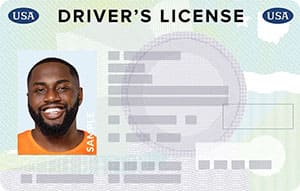- Updated for December 2024
- Based on official Texas Driver's manual
Free Texas DMV Permit Practice Test Three 2024
Doesn’t matter if you live in a busy city or on a lonesome ranch, you will never go wrong trying to get a driving license. We are ready to provide you assistance in getting ready for a DMV exam – look at our 3rd TX permit practice test. Doing it will make you familiar with the question format and scoring system of a standard DMV Permit Test – and it’s easier to do the real thing once you know what to expect. All our questions is based on the latest official Texas Drivers Handbook, where you learn all you need to know about road signs and traffic rules. They are available for you to practice at any time you want and as many times as you need – at no cost. If you take a look, you’ll notice there’s no registration required, which means that no payments, whether direct or hidden, are applied. Sounds good? Then get started!
Try the first question below – like all the rest, it has four answers and your task is to click the right one. Take your time – if you’re in doubt, you can try our hints for help – and this is the only feature that differs our practice test from a real DMV exam, which doesn’t have hints. The progress bar on the left-hand side of the page will let you know if your choice is correct by marking your answer with green – welcome to the next question. However, if your answer is wrong, the bar will flash red and you’ll be offered an explanation – read carefully if you don’t want to make the same mistake again.
Go through all the 40 questions and check the final result – you can always have another try if you opt for improvement, and the tasks will be randomized for you. If you find our TX permit practice test helpful, don’t make it confidential – tweet your friends about it or simply hit the “Like” button above. Start making a change in your life – the best of luck!
Perfect for
- Texas Learner’s Permit
- Texas Driver’s License
- TX Senior Citizens’ Refresher Test
- TX Driver’s License Renewal
- Perfect for learner’s permit, driver’s license, and Senior Refresher Test
- Triple-checked for accuracy
What you need to know

What to expect on the actual TX DMV exam
questions
correct answers to pass
passing score
minimum age to apply
Helpful links
List of questions (classic view)
- A __________ offers you the best possible protection in a car crash and is therefore your best defense against a drunk driver.
- When preparing to leave a parallel parking space, you should
- If your engine dies as you're driving on a curve, you should
- If it starts to rain on a hot day, use caution because the pavement may be slippery for the first few minutes. This is due to
- When two vehicles meet on a steep mountain road where neither can pass, which vehicle has the right-of-way?
- If you are approaching an intersection and see a steady yellow traffic light, you should
- When you encounter a truck traveling next to you, keep as far as possible to the side to avoid
- When making a left turn at an intersection or into an alley or driveway, you must yield the right-of-way to
- The hand and arm bent at 90 degrees and pointing downward indicate the driver's intention to
- When making a U-turn, you must NOT
- A flashing red signal indicates that you must _________ before going farther.
- You can avoid panic stops by
- Rear-end crashes are common on highways because many drivers
- In Texas, if you approach a person with a white cane or a white cane tipped with red who is about to cross the road, you must
- If a tire suddenly goes flat while you're driving, you should
- If you are going to stop or slow down where others might not expect it, you should _________ to warn those behind you.
- What does this sign indicate?
- On a multilane roadway with several lanes in your direction, you must use _________ for passing.
- A two-headed arrow with one head pointing straight ahead and the other pointing left means that
- At an intersection, a steady yellow arrow signal pointing left means
- What does this sign indicate?
- To avoid last-minute braking or the need to turn suddenly, you should look at least ________ ahead while driving in the city.
- Tailgating is the practice of
- Rain, snow, and ice impair your ability to see ahead and can make roads more slippery. To be able to stop safely, you should
- At an intersection, a single solid white line across the road means that you must _________ for a traffic signal or sign.
- If you see a yield sign in your lane, you must
- A roundabout is a circular intersection in which vehicles travel around a center island in _________ direction.
- What does this sign indicate?
- __________ are usually diamond shaped with black lettering or symbols on a yellow background.
- If your rear wheels start to skid, what should you do?
- For better visibility in fog, rain, or snow, use your
- A red arrow signal at an intersection indicates that
- If you are about to pass a bicycle to your immediate right and an oncoming vehicle is approaching you on your immediate left, what should you do?
- If a broken yellow line is on your side of the centerline,
- To avoid a head-on collision if there is an oncoming vehicle in your lane, you should
- _________ can occur if you drive at high speed on a wet road.
- What does this sign indicate?
- While you are driving, talking on a cell phone may increase your chances of being in a crash by
- To turn around on a narrow, two-way street, you may make
- Which of the following statements about passing a vehicle is FALSE?
- Alabama: Test 1 / Test 2
- Alaska: Test 1 / Test 2
- Arizona: Test 1 / Test 2
- Arkansas: Test 1 / Test 2
- California: Test 1 / Test 2
- Colorado: Test 1 / Test 2
- Connecticut: Test 1 / Test 2
- Delaware: Test 1 / Test 2
- District of Columbia: Test 1 / Test 2
- Florida: Test 1 / Test 2
- Georgia: Test 1 / Test 2
- Hawaii: Test 1 / Test 2
- Idaho: Test 1 / Test 2
- Illinois: Test 1 / Test 2
- Indiana: Test 1 / Test 2
- Iowa: Test 1 / Test 2
- Kansas: Test 1 / Test 2
- Kentucky: Test 1 / Test 2
- Louisiana: Test 1 / Test 2
- Maine: Test 1 / Test 2
- Maryland: Test 1 / Test 2
- Massachusetts: Test 1 / Test 2
- Michigan: Test 1 / Test 2
- Minnesota: Test 1 / Test 2
- Mississippi: Test 1 / Test 2
- Missouri: Test 1 / Test 2
- Montana: Test 1 / Test 2
- Nebraska: Test 1 / Test 2
- Nevada: Test 1 / Test 2
- New Hampshire: Test 1 / Test 2
- New Jersey: Test 1 / Test 2
- New Mexico: Test 1 / Test 2
- New York: Test 1 / Test 2
- North Carolina: Test 1 / Test 2
- North Dakota: Test 1 / Test 2
- Ohio: Test 1 / Test 2
- Oklahoma: Test 1 / Test 2
- Oregon: Test 1 / Test 2
- Pennsylvania: Test 1 / Test 2
- Rhode Island: Test 1 / Test 2
- South Carolina: Test 1 / Test 2
- South Dakota: Test 1 / Test 2
- Tennessee: Test 1 / Test 2
- Texas: Test 1 / Test 2
- Utah: Test 1 / Test 2
- Vermont: Test 1 / Test 2
- Virginia: Test 1 / Test 2
- Washington: Test 1 / Test 2
- West Virginia: Test 1 / Test 2
- Wisconsin: Test 1 / Test 2
- Wyoming: Test 1 / Test 2
Your go-to, trusted source
Experience the Driving-Tests differenceOur commitment to accuracy and quality in our practice tests
Explore our rigorous, multi-tiered verification process that ensures each question mirrors the official manual for unparalleled accuracy.

At Driving-Tests.org, we understand the importance of reliable and accurate practice tests to help you prepare for your DMV exam. That's why we've developed a meticulous process to create and continually update our practice questions, ensuring they reflect the most current driving laws and regulations.
Here's an inside look at how we maintain the highest quality in our practice tests.
Content Creation and Verification Process
- Alignment with Official Manuals:
Every question we develop is based on the most recent version of each state's official driving manual. Our team regularly monitors each state DMV's website for the latest updates to ensure our practice tests are always aligned with the most current information. - Community Feedback Integration:
We leverage feedback from our vast community of users to understand which topics are most frequently tested. This helps us focus on the areas that are most relevant and beneficial for your preparation. - Expert Content Creation:
Our in-house editor, Steven, who has extensive experience in driver education, crafts each question with precision. He conducts a thorough review of each question against the official manuals to ensure accuracy. - Rigorous Review Process:
Once Steven has finalized a set of questions, our team conducts a joint review session. This second level of scrutiny involves content accuracy, proofreading, and fact-checking to eliminate any errors. - User Feedback Mechanism:
After a question goes live on our site, we keep the lines of communication open. Each question features a feedback button, inviting users to report any issues or errors. This continuous feedback loop allows us to address and rectify any concerns promptly. - Responsive Updates:
In line with our commitment to accuracy, we quickly update our practice questions to reflect any changes in the DMV manuals. Additionally, we update the free electronic copy of the state's driver's license manuals on our site, typically within a few days after the DMV publishes them.
Our thorough quality control process ensures that you have access to practice tests that are as accurate and up-to-date as possible. We believe in the power of well-prepared drivers and are dedicated to providing you with the best study tools to help you succeed on your DMV exam.
